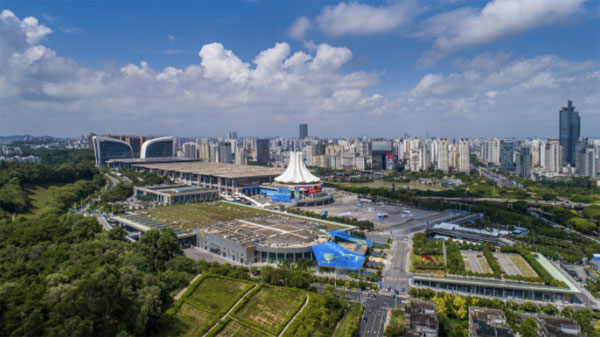
The 18th China-ASEAN Expo (CAEXPO) takes place both online and offline on Friday in Nanning, capital of South China's Guangxi Zhuang autonomous region. [Photo/Xinhua]
Deeper engagements between China and countries in Southeast Asia will be pursued with the help of free-trade arrangements and improved transport links, a forum has heard.
Speakers at the event on Saturday looked into ways to advance the 30-year partnership between China and the 10 members of the Association of Southeast Nations.
At the forum, part of the 18th China-ASEAN Expo and China-ASEAN Business and Investment Summit in Nanning, ASEAN Secretary-General Lim Jock Hoi said the ASEAN-China Free Trade Area-the bedrock of economic relations between two sides-should be faithfully implemented and be made relevant and responsive to the challenges of trade issues in the 21st century.
"ASEAN and China should continue discussion on the ways forward to upgrade the ACFTA in a timely manner. This is vital for our post-pandemic economic recovery efforts," Lim said.
Jurin Laksanawisit, Thai deputy prime minister and minister of commerce, said ASEAN and China are important partners.
Jurin said the two sides have always adhered to the principle of mutual respect and jointly pursued prosperity in all sectors. In particular, he said their anti-pandemic cooperation has set an example for international cooperation.
Noting that the Belt and Road Initiative has promoted international trade cooperation, he said Thailand also highly values the importance of a multilateral trade system in boosting global economic growth.
Low Kian Chuan, president of the National Chamber of Commerce and Industry of Malaysia, said his organization supports cooperation to promote what Low called multidimensional connectivity between Southeast Asia and Eurasia through central and western China.
"In the post-pandemic era, we need to further promote the China-ASEAN cooperation to reach a new 30-year high," said Low.
A land-sea corridor featuring multimodal transport networks will play a key role in enhancing economic and trade cooperation between China and the regional grouping.
New corridor
"The impact of the new corridor is obvious," said Sun Dawei, chairman of the Chinese People's Political Consultative Conference Guangxi Committee, referring to the New International Land-Sea Trade Corridor that was launched in September 2017 by provincial-level regions in western China, Singapore and other Southeast Asian economies.
Sun was speaking on Friday at the China-ASEAN Business Leaders Forum and Special Meeting on the 30th Anniversary of the China-ASEAN Dialogue Relations, an event held online and offline in Nanning, the capital of South China's Guangxi Zhuang autonomous region.
Some 4,596 sets of sea-rail freight trains were operated on the trade corridor in 2020, exceeding the total number of trains operated in the previous three years, according to Sun.
With the route, goods from western China can be shipped to and from countries such as Singapore through the Beibu Gulf in Guangxi by road, rail and water. The route also connects Europe to Southeast Asia.
Gao Yan, chairperson of the China Council for the Promotion of International Trade, noted the progress in building the corridor, together with sub-regional frameworks such as the Lancang-Mekong Cooperation and the China-ASEAN Eastern Growth Area.
Gao said business communities in China and the ASEAN bloc have reaped huge benefits from the deepened economic and trade cooperation, achieving shared development.
"Over the past 30 years, the trade volume between China and ASEAN economies increased by 85 times, with the cumulative investment between the two sides exceeding $310 billion," Gao said told the same forum on Friday.
During the event, participants welcomed the launch of an initiative that aims to promote joint consultations, contributions and shared benefits from the New International Land-Sea Trade Corridor. The project is called "Cross-border Supply Chain Digital Collaboration via the New International Land-Sea Trade Corridor".
Benedicto V. Yujuico, president of the Philippine Chamber of Commerce and Industry, said the trade corridor will be an important channel for Philippine products to enter China, and even Central Asia and Europe.
Yujuico said he hopes the construction of the corridor can be further accelerated and that it can help promote connectivity in container logistics between the Beibu Gulf and the Manila port.
The expo began on Friday with participants taking part on site and online.